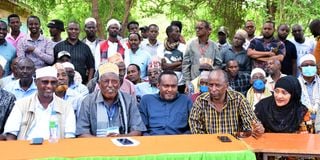Premium
Negotiated democracy tests Uhuru's selling of Raila in north-east

Leaders, among them former Isiolo Governor Godana Doyo and Borana Council of Elders Chairman Abdullahi Gonjobe during a recent meeting in Kinna, Garbatulla. The team has initiated talks to ensure they all support one presidential candidate.
President Uhuru Kenyatta’s quest to consolidate over 800,000 votes in Northern Kenya for ODM leader Raila Odinga could be put to the test after he expressed his reservations over negotiated democracy widely practised in the region.
The President has already declared his support for Mr Odinga as his preferred successor.
Elders from the majority of the pastoralist communities have met and agreed on the leaders to represent them in various elective posts in the August elections, with the names of aspirants made public.
Mr Kenyatta, who has in the past three days met delegations of leaders from Marsabit, Tana River, Mandera and Isiolo counties, has been candid on the need for inclusion and fairness.
When he met Marsabit leaders, led by Treasury CS Ukur Yatani and North Horr MP Francis Chachu Nganya, the President was categorical that all political sides must be represented in county and national positions.
“Whether you elect Rendille, Gabbra, Borana, Sakuye or any other communities, there must be representation on both sides of the divide,” Mr Kenyatta said while seemingly lecturing the leaders at State House on Thursday.
Repeated complaints
The directive, sources say, was prompted by repeated complaints by some leaders from the region that some of the communities were being marginalised, which Mr Kenyatta was allegedly told could jeopardise ongoing plans to rally the region behind Mr Odinga’s candidacy.
There has been growing resistance (to negotiated democracy) from residents and aspirants, with those opposed saying the method, mooted as an ideal way to prevent election-related violence through sharing of positions, was alienating and marginalising some communities and groups such as women and people living with disabilities.
The method allows elders to negotiate for elective posts, pick candidates to vie and rally the community to support them.
The continued fielding of candidates for all elective posts by larger communities has caused discontent among other communities, including minority groups, who say the method was a threat to diversity.
Borana community line-up
In Isiolo, for instance, endorsement of the Borana community line-up for five seats of governor, senator, MPs and woman rep elicited mixed reactions, with other communities terming the decision selfish.
The community elders gave former governor Godana Doyo, Isiolo Assembly ex-Speaker Mohammed Tupi and Nuh Mohammed Ibrahim the green light to vie for the governor, Isiolo South MP and Senate seats respectively and gave County MP Rehema Jaldesa and Isiolo North MP Hassan Odha the nod to seek re-election.
But former EACC boss Halakhe Waqo and Education ex-CAS Mumina Bonaya, from the Borana’s Karayu and Warjida clans respectively disregarded the elders' verdict and maintained that they will go to the ballot as the final decision lies with voters.
Former Isiolo South MP Abdullahi Banticha has also vowed to go to the ballot after losing the endorsement to Mr Tupi, who is perceived to be among the incumbent MP Abdi Koropu’s main challengers.
Isiolo Speaker Hussein Roba has also defied the elders’ direction and will vie against Mr Nuh, who was picked by his Borana community, as both seek to unseat Senator Fatuma Dullo.
Isiolo Interfaith Network secretary Stephen Kalunyu was the first to condemn the Borana Council of Elders’ endorsement, terming it unfair and discriminatory.
“The decision is unfair, biased and discriminatory. To grow the county fairly for peace and development, the elective slots should be shared with other communities. The elders should reconsider the decision,” Mr Kalunyu said.
Let voters decide
With the majority of aspirants unveiled and the likelihood that the elders will not reverse their decision, President Kenyatta might be forced to let voters decide, as leaning on either side could cost Mr Odinga significant votes. Post-election agreements with those who agree to step down and losers could salvage the situation.
President Kenyatta has been using the platform to call for political tolerance through an amicable ironing out of differences and to mobilise support for Mr Odinga. The meetings have brought together foes such as Mr Yatani and Marsabit Governor Mohammud Ali.
“Our political competition should not undermine peace and security,” Mr Kenyatta said during Thursday's meeting while asking the leaders to preach peace during the campaign period.
Besides assuring the President of their undivided loyalty, the leaders took the opportunity to push for drought interventions, access to clean water, enhanced security and food security for the region.
In a clear indication that he was keen on who takes over from him, Mr Kenyatta, while meeting the Isiolo delegation, said ongoing work must continue as it could not be completed in one or two terms.
“We have come together from far and have a long way to go. Work must continue,” he said while welcoming Ms Jaldesa, the Isiolo woman rep, who decamped to Jubilee from DP Ruto’s United Democratic Alliance Party.
Ms Jaldesa said she was back home in Jubilee and was President Kenyatta’s foot soldier. “All the differences we had were out of anger,” she said.
Mr Doyo said they will follow President Kenyatta’s direction and hailed his transformative leadership and development achieved during his two terms as President.
“We are ready and waiting for you to give us direction, including the party we should vie on,” he said.
The leaders said the President promised four boreholes for areas hit worst by drought, another sub-county in Isiolo South and livestock off-take to cushion pastoralists against losses.





